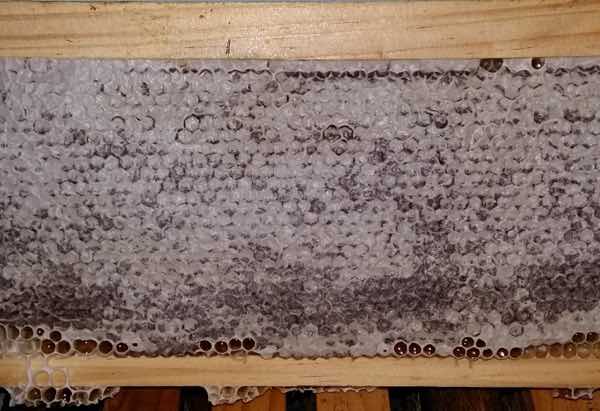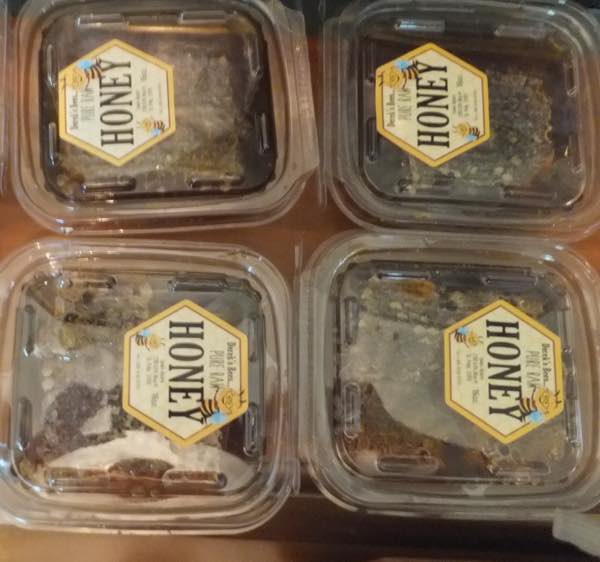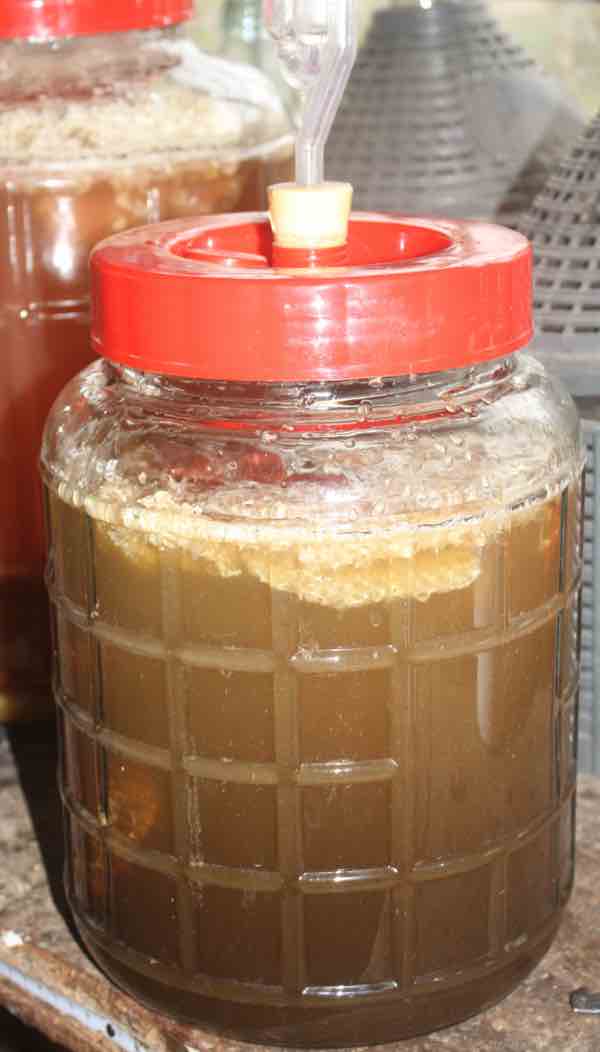- Bernard Preston homepage
- Our natural honey
- Where to Get Raw Honey
Where to get raw honey?
Where to get raw honey may be confusing; don't start with the grocery store. Commercial bottlers have to heat it, spoiling the nectar and raising the GI alarmingly.
Most foods not just meat and dairy products have a shelf life; once a leaf of lettuce is plucked from the plant, a grain of wheat is milled or a nut is cracked, oxygen begins the work of decay. Try slicing an apple in half and watching how long it takes for the cut surface to start going brown.
Raw honey is an exception; jars of the nectar of the gods located in the ancient tombs of pharaohs were still edible when they were found. You just have to keep air, light and heat away.
 Wax cappings keep the air out
Wax cappings keep the air outIn the hive where it's dark, the temperature is maintained below 40oC and sealed by the cappings, honey is preserved indefinitely. The moment the beekeeper removes the comb from the box, nature begins to do its work of decay; it is a fundamental order of the universe.
We can mitigate against light, heat and air but nature will seek to do what it was designed to accomplish.
Honeycomb
Raw honey still in the comb remains first choice but for various reasons it is very expensive; and rightly so.
Commercial beekeepers and bottlers who are dealing with tons of honey every day are more or less obliged to use heat to prevent it from becoming viscous. Foreign material like the so-important pollen has to be strained out.

So where to get natural honey may seem a lot of trouble; it's not. Remember that raw and unprocessed it will keep for decades, even centuries in a sealed bottle; buy enough for the whole year.
Start by typing beekeeper and your location into Google. Suss out a small local apiarist.
Next find out when the chief honey flow begins. If possible try to get your raw product from the second or third harvest. Phone and ask if you can fill a dozen of your own glass jars straight from the bottling tank; that will save you some cash.
Make sure the glass bottles are absolutely clean and dry; first in the dishwasher and then out in the hot sun.
Questions to ask
You may have to visit a number of beekeepers over the years; some are more fastidious than others about producing truly raw honey. Casually look around for an electric knife and perhaps carefully frame a question about decapping tools; they may be sensitive to such searching inquiries. Forks, scrapers and rollers use no heat.
Ask if it's been "warmed."
Ideally one wants the pollen from the local plants to remain in the raw honey you are purchasing; it helps with allergies.
But to call it "pure honey" the keeper really should remove all foreign particles including the pollen. A series of very fine filters are used. You don't want to find a dead bee in your bottle.
There is a compromise. Small keepers are able to let their honey settle for a few days before bottling. Foreign material like bee parts, bits of wax cappings and other junk float to the surface; and can be skimmed off. The pollen remains in the liquid.
Get to know your beekeeper
Small beekeepers are generally obliging people. They are unlikely to refuse a request for a dozen of your own jars straight from the bottling tank; particularly if you pay in hard cash.
Once a year having to locate a source of raw honey need not be so onerous. In fact you may find yourself wondering about keeping your own beehive in the back garden.
Can diabetics eat raw honey?
There is no simple answer to the question about diabetics eating raw honey. We all react differently to carbs and should test ourselves.
The research[1] shows that even very large amounts of raw honey (25 tsp) will lower fasting blood glucose; but will raise the HbA1c. However no person in their right mind would eat half a cup in one day.
I am prediabetic and limit myself to certainly no more than five teaspoons in one day; that's enough to get the benefits without the downside of raising the A1c.
Where to get raw honey?
Where to get raw honey should not be too difficult. Start by googling "beekeeper and the name of your district."
Is eating raw honey safe?
Personally I would not touch runny commercial honey from the grocery store. It is likely to have a high GI; and is after olive oil the second most adulterated food in the world. Of course there are exceptions; those with a high fructose content will stay liquid for much longer.
Raw honey is perfectly safe to eat but diabetics and the obese should limit the load; perhaps three teaspoons per day initially.
There is an erroneous belief that babies should not eat raw honey; based on six cases of botulism in recorded history. The usual source of the bacterium is common dirt; it was not proved that the toddlers had not come into contact with earth in the garden.
It is my firm conviction that raw honey is one of the "very good" foods; alas I cannot say that with assurance about purchases from the grocery store.
MeaD
As with honey commercial alcohol raises big questions; researchers tell us that nearly fifty folk die every single day of the year in Great Britain from a malignant tumour directly caused by their drinking[2]. One of the great joys of being keepers is being able to brew our own mead.
We use different herbs, fruits and spices to further enrich the brew; making this medicinal turmeric mead from raw honey enhances wellness. It tastes and is astonishingly good.
 Medicinal turmeric mead
Medicinal turmeric meadWhen browsing use right click and "Open Link in New Tab" or you may get a bad gateway signal.
Newsletter
Our newsletter is entitled "create a cyan zone" at your home, preserving both yourself and Mother Earth for future generations; and the family too, of course. We promise not to spam you with daily emails promoting various products. You may get an occasional nudge to buy one of my books.
Here are the back issues.
- Lifestyle and ideal body weight
- What are ultra-processed foods?
- Investing in long-term health
- Diseases from plastic exposure
- Intensive lifestyle management for obesity has limited value
- A world largely devoid of Parkinson's Disease
- The impact of friendly bacteria in the tum on the prevention of cancer
- There's a hole in the bucket
- Everyone is talking about weight loss drugs
- Pull the sweet tooth
- If you suffer from heartburn plant a susu
- Refined maize meal and stunting
- Should agriculture and industry get priority for water and electricity?
- Nature is calling
- Mill your own flour
- Bake your own sourdough bread
- Microplastics from our water
- Alternative types of water storage
- Wear your clothes out
- Comfort foods
- Create a bee-friendly environment
- Go to bed slightly hungry
- Keep bees
- Blue zone folk are religious
- Reduce plastic waste
- Family is important
- What can go in compost?
- Grow broad beans for longevity
- Harvest and store sunshine
- Blue zone exercise
- Harvest and store your rainwater
- Create a cyan zone at your home
Did you find this page interesting? How about forwarding it to a friendly book or food junkie? Better still, a social media tick would help.
- Bernard Preston homepage
- Our natural honey
- Where to Get Raw Honey
Address:
56 Groenekloof Rd,
Hilton, KZN
South Africa
Website:
https://www.bernard-preston.com